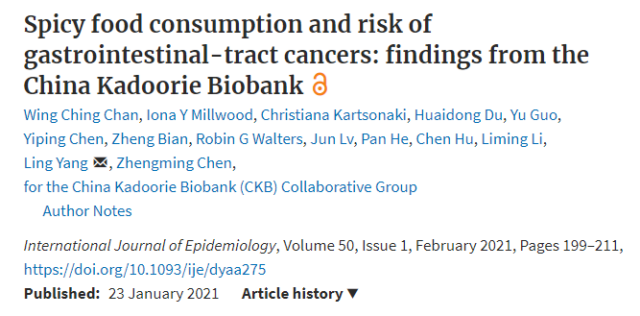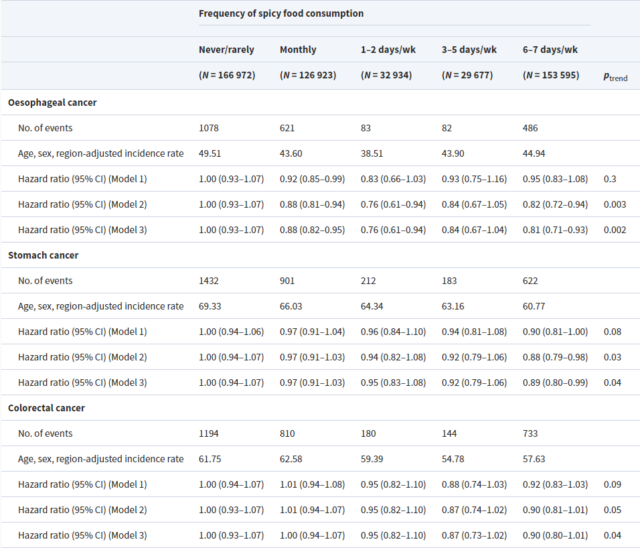Eating more spicy can reduce the risk of gastrointestinal cancer?
- Aspirin: Study Finds Greater Benefits for These Colorectal Cancer Patients
- Cancer Can Occur Without Genetic Mutations?
- Statins Lower Blood Lipids: How Long is a Course?
- Warning: Smartwatch Blood Sugar Measurement Deemed Dangerous
- Mifepristone: A Safe and Effective Abortion Option Amidst Controversy
- Asbestos Detected in Buildings Damaged in Ukraine: Analyzed by Japanese Company
Eating more spicy can reduce the risk of gastrointestinal cancer?
Eating more spicy can reduce the risk of gastrointestinal cancer? Pepper has anti-inflammatory, anti-oxidant, anti-cancer, and blood sugar regulation effects.
According to statistics, the incidence of esophageal cancer and gastric cancer in China is particularly high, accounting for more than half of the global burden of these two cancers, and China’s esophageal cancer is the country with the highest incidence and mortality.
Pepper has anti-inflammatory, anti-oxidant, anti-cancer, and blood sugar regulation effects. Among Chinese adults, about one-third eat spicy food almost every day. At present, the relationship between spicy food and gastrointestinal cancer is unclear.
Recently,
Studies have shown that the frequency of eating spicy foods is negatively correlated with the risk of digestive tract cancer. Compared with those who hardly eat spicy food every day, the risk of esophageal cancer, gastric cancer and bowel cancer decreased by 19%, 11% and 10%, respectively. Among non-smokers, the risk reduction was even more pronounced, reaching 43%.

This is a large-scale prospective study that included 510,000 participants from 5 cities and 5 rural areas in China. The definition of eating spicy food includes: fresh chili, dried chili, chili oil, sauce, curry and cooking products are added directly, and it also includes chili oil when eating.
According to the frequency of consumption, the participants were divided into 5 groups: never eat spicy food, occasionally (once a month), 1-2 days a week, 3-5 days a week or 6-7 days a week.
In total, among the 510,000 participants, 30% eat spicy food every day, and 32.7% never eat spicy food. In the 10 regions, 2/3 of the participants in the 6-7 days per week group came from two rural areas in Hunan and Sichuan.
During an average follow-up of 10.1 years, a total of 8761 cases of gastrointestinal cancer occurred, including 2350, 3350, and 3061 cases of esophageal cancer, gastric cancer, and bowel cancer, respectively.
After adjusting for demographics, lifestyle, and other dietary factors, the frequency of spicy foods was negatively correlated with the risk of gastrointestinal cancer.
For esophageal cancer, compared with people who never eat spicy food, the other four groups have 12%, 24%, 16%, and 19% risk reductions, and gastric cancer is 3%, 5%, 8%, and 11%, respectively.
For bowel cancer, only the last three groups have reduced risks, which are 5%, 13%, and 10%, respectively.

The incidence of gastrointestinal cancer and the adjusted risk ratio of spicy food consumption frequency
Interestingly, for those who do not drink or smoke, the benefits of eating chili will be greater.
For non-smokers, people who eat spicy food every day have a risk reduction of 43% compared to the baseline data. Similar results were obtained in non-drinking people. If you neither smoke nor drink alcohol, then eating chili can better reduce the risk of cancer.
In general, this study is the first prospective study to evaluate the relationship between spicy food consumption by Chinese adults and the risk of gastrointestinal cancer. This study confirmed in the Chinese population that a higher frequency of eating spicy food is significantly associated with a lower risk of gastrointestinal cancer, especially esophageal cancer, which is more prominent in people who do not smoke or drink.
(source:internet, reference only)
Disclaimer of medicaltrend.org
Important Note: The information provided is for informational purposes only and should not be considered as medical advice.



